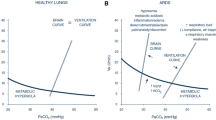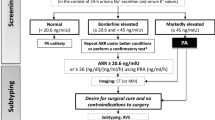Abstract
Purpose of Review
This review seeks to present an overview of the recently found association between refractory hypertension (RfH) and obstructive sleep apnoea (OSA).
Recent Findings
RfH was recently defined as an extreme phenotype of resistant hypertension characterized by the lack of blood pressure control despite using ≥ 5 antihypertensive drugs at optimal doses. Current data support that the pathophysiological pathway of both types of hypertension is different. The main mechanism involved in resistant hypertension is fluid retention whereas in the case of RfH is the sympathetic over-activity. OSA is now recognized as a cause of hypertension (especially in the case of difficult-to-treat hypertension). It seems that the biological mechanism linking OSA and arterial hypertension is the sympathetic over-activity related to the respiratory events (apnoeas and hypopnoeas) during the night. So, it is not surprising that, although the literature is scarce, some studies have found a very high prevalence of OSA and an excess of sympathetic activity in patients with RfH. Finally, a very recent study demonstrated that continuous positive airway pressure (CPAP) treatment, which controls sympathetic activation in OSA patients, achieves very significant reductions in blood pressure levels in RfH patients, even greater than in those with resistant (non-refractory) hypertension.
Summary
The prevalence of OSA in patients with RfH is very high. CPAP treatment achieves a clinically significant reduction in blood pressure levels in those patients with RfH (especially in night readings). Patients with RfH must be sent to a sleep unit for a study.



Similar content being viewed by others
References
Papers of particular interest, published recently, have been highlighted as: • Of importance •• Of major importance
•• Calhoun DA, Jones D, Textor S, Goff DC, Murphy TP, Toto RD, et al. Resistant hypertension: diagnosis, evaluation, and treatment a scientific statement from the American Heart Association Professional Education Committee of the Council for High Blood Pressure Research. Circulation. 2008;117(25):e510–26. This is the most important specific guidelines on resistant hypertension.
Kumbhani DJ, Steg PG, Cannon CP, Eagle KA, Smith SC Jr, Crowley K, et al. Resistant hypertension: a frequent and ominous finding among hypertensive patients with atherothrombosis. Eur Heart J. 2013;34(16):1204–14.
Persell SD. Epidemiology/population studies prevalence of resistant hypertension in the United States, 2003–2008. Hypertension. 2011;57:1076–80.
Egan BM, Zaho Y, Axon RN, Brezinsky WA, Ferdinand KC. Uncontrolled and apparent treatment resistant hypertension in the United States, 1988-2008. Circulation. 2011;124:1046–58.
• de la Sierra A, Segura J, Banegas JR, Gorostidi M, de la Cruz JJ, Armario P, et al. Clinical features of 8295 patients with resistant hypertension classified on the basis of ambulatory blood pressure monitoring. Hypertension. 2011;57:898–902. The largest series of patients analized with resistant hypertension.
Pierdomenico SD, Lapenna D, Bucci A, Di Tommaso R, Di Mascio R, Manente BM, et al. Cardiovascular outcome in treated hypertensive patients with responder, masked, false resistant, and true resistant hypertension. Am J Hypertens. 2005;18(11):1422–8.
Daugherty SL, Powers JD, Magid DJ, Tavel HM, Masoudi FA, Margolis KL, et al. Incidence and prognosis of resistant hypertension in hypertensive patients. Circulation. 2012;125(13):1635–42.
Tsioufis C, Kasiakogias A, Kordalis A, Dimitriadis K, Thomopoulos C, Tsiachris D, et al. Dynamic resistant hypertension patterns as predictors of cardiovascular morbidity. J Hypertens. 2014;32(2):415–22.
Holmqvist L, Boström KB, Kahan T, Schiöler L, Hasselström J, Hjerpe P, et al. Cardiovascular outcome in treatment-resistant hypertension: results from the Swedish Primary Care Cardiovascular Database (SPCCD). J Hypertens. 2018;36(2):402–9.
•• Calhoun DA, Booth JN III, Oparil S, Irvin MR, Shimbo D, Lackland DT, et al. Refractory hypertension: determination of prevalence, risk factors, and comorbidities in a large, population-based cohort. Hypertension. 2014;63:451–8. A comprehensive review on the new refractory hypertensive phenotype in a large series of patients.
Modolo R, de Faria AP, Sabbatini AR, Barbaro NR, Ritter AM, Moreno H. Refractory and resistant hypertension: characteristics and differences observed in a specialized clinic. J Am Soc Hypertens. 2015;9(5):397–402.
•• Dudenbostel T, Siddiqui M, Oparil S, Calhoun DA. Refractory hypertension: a novel phenotype of antihypertensive treatment failure. Hypertension. 2016;67:1085–92. Other interesting paper adding more evidence and comments on the exitence of a refractory hypertensive phenotype.
• Acelajado M, Hughes Z, Oparil S, Calhoun DA. Treatment of resistant and refractory hypertension. Circ Res. 2019;124:1061–70. Paper describing the comparative similitudes and differences between the treatment of resistant and refractory hypertension.
•• Acelajado MC, Pisoni R, Dudenbostel T, Dell'Italia LJ, Cartmill F, Zhang B, et al. Refractory hypertension: definition, prevalence, and patient characteristics. J Clin Hypertens (Geenwich). 2012;14(1):7–12. One of the first papers describing the new refractory hypertension phenotype of patients.
• Dudenbostel T, Acelajado MC, Pisoni R, Li P, Oparil S, Calhoun DA. Refractory hypertension: evidence of heightened sympathetic activity as a cause of antihypertensive treatment failure. Hypertension. 2015;66:126–33. An interesting paper describing the most likely pathophisiological mechanisms related to refractory hypertension.
• Armario P, Calhoun DA, Oliveras A, Blanch P, Vinyoles E, Banegas JR, et al. Prevalence and clinical characteristics of refractory hypertension. J Am Heart Assoc. 2017;6(12):e007365. https://doi.org/10.1161/JAHA.117.007365. One more key paper on the prevalencia and clinical characteristics of refractory hypertensive patients.
Duran J, Esnaola S, Rubio R, Iztueta A. Obstructive sleep apnea- hypopnea and related clinical features in a population based sample of subjects aged 30–70 yr. Am J Respir Crit Care Med. 2001;163(3 Pt1):685–9.
Peppard PE, Young TY, Barnet JH, Palta M, Hagen EW, Hla KM. Increased prevalence of sleep-disordered breathing in adults. Am J Epidemiol. 2013;177:1006–14.
Sánchez-de-la-Torre M, Campos-Rodriguez F, Barbé F. Obstructive sleep apnoea and cardiovascular disease. Lancet Respir Med. 2013;1(1):61–72.
Pedrosa RP, Drager LF, Gonzaga CC, Sousa MG, de Paula LK, Amaro AC, et al. Obstructive sleep apnea: the most common secondary cause of hypertension associated with resistant hypertension. Hypertension. 2011;58(5):811–7.
Friedman O, Bradley TD, Chan CT, Parkes R, Logan AG. Relationship between overnight rostral fluid shift and obstructive sleep apnea in drug-resistant hypertension. Hypertension. 2010;56:1077–82.
Demede M, Pandey A, Zizi F, Bachmann R, Donat M, Mcfarlane SI, et al. Resistant hypertension and obstructive sleep apnea in the primary-care setting. Int J Hypertens. 2011;2011:240929.
•• Martínez-García MA, Capote F, Campos-Rodriguez F, Lloberes P, Díaz de Atauri MJ, Somoza M, et al. Effect of CPAP on blood pressure in patients with obstructive sleep apnea and resistant hypertension. The HIPARCO randomized clinical trial. JAMA. 2013;310(22):2407–15. The largest randomized clinial trial on the positive effect of continuous positive airway pressure on blood pressure levels in patients with resistant hypertension.
Iftikhar IH, Valentine CW, Bittencourt LR, Cohen DL, Fedson AC, Gislason T, et al. Effect of continuous positive airway pressure on blood pressure in patients with resistant hypertension and obstructive sleep apnea: a meta-analysis. J Hypertens. 2014;32(12):2341–50.
Liu L, Cao Q, Guo Z, et al. Continuous positive airway pressure in patients with obstructive sleep apnea and resistant hypertension : a meta-analysis of randomized controlled trials. J Clin Hypertens (Greenwich). 2016;18(2):153–8.
Martínez-García MA, Gómez-Aldaraví R, Soler-Cataluña JJ, Martínez TG, Bernácer-Alpera B, Román-Sánchez P. Positive effect of CPAP treatment on the control of difficult-to-treat hypertension. Eur Respir J. 2007;29:951–7.
Hwang AY, Dietrich E, Pepine CJ, Smith SM. Resistant hypertension: mechanisms and treatment. Curr Hypertens Rep. 2017;19(7):56.
Tsioufis C, Kordalis A, Flessas D. Pathophysiology of resistant hypertension: the role of sympathetic nervous system. Int J Hypertens. 2011;2011:642416.
Williams B, MacDonald TM, Morant S, Webb DJ, Sever P, McInnes G, et al. Spironolactone versus placebo, bisoprolol, and doxazosin to determine the optimal treatment for drug-resistant hypertension (PATHWAY-2): a randomised, double-blind, crossover trial. Lancet. 2015;386(10008):2059–68.
Dudenbostel T, Siddiqui M, Gharpure N, Calhoun DA. Refractory versus resistant hypertension: novel distinctive phenotypes. J Nat Sci. 2017;3(9):e430.
Muxfeldt ES. Prevalence of obstructive sleep apnea in refractory hypertension. Hypertension. 2018;72(3):592–3.
Javaheri S, Barbe F, Campos-Rodriguez F, Dempsey JA, Khayat R, Javaheri S, et al. Sleep apnea: types, mechanisms, and clinical cardiovascular consequences. J Am Coll Cardiol. 2017;69(7):841–58.
Dempsey JA, Veasey SC, Morgan BJ, O'Donnell CP. Pathophysiology of sleep apnea. Physiol Rev. 2010;90(1):47–112.
•• Martínez-García MA, Navarro-Soriano C, Torres G, Barbé F, Caballero-Eraso C, Lloberes P, et al. Beyond resistant hypertension relationship between refractory hypertension and obstructive sleep apnea. Hypertension. 2018;72(3):618–24. First study published on the relationship between obstructive sleep apnea and refractory hypertension.
Fletcher EC, DeBehnke RD, Lovoi MS, Gorin AB. Undiagnosed sleep apnea in patients with essential hypertension. Ann Intern Med. 1985;103(2):190–5.
Silverberg DS, Oksenberg A. Are sleep-related breathing disorders important contributing factors to the production of essential hypertension? Curr Hypertens Rep. 2001;3(3):209–15.
Ahmad M, Makati D, Akbar S. Review of and updates on hypertension in obstructive sleep apnea. Int J Hypertens. 2017;2017:1848375.
Logan AG, Perlikowski SM, Mente A, et al. High prevalence of unrecognized sleep apnoea in drug-resistant hypertension. J Hypertens. 2001;19(12):2271–7.
Gonçalves SC, Martinez D, Gus M, et al. Obstructive sleep apnea and resistant hypertension: a case-control study. Chest. 2007;132(6):1858–62.
Montesi SB, Edwards BA, Malhorta A, Baker JP. The effect of continuous positive airway pressure treatment on blood pressure: a systematic review and meta-analysis of randomized controlled trials. J Clin Sleep Med. 2012;8(5):587–96.
Fava C, Dorignoni S, Dalle Vedove F, Danese E, Montagnana M, et al. Effect of CPAP on blood pressure in patients with OSA/hypopnea. A systematic review and meta-analysis. Chest. 2014;145(4):762–71.
Bakker J, Edwards B, Gautam S, Montesi S, Duran-Cantolla J, Aizpuru F, et al. Blood pressure improvement with continuous positive airway pressure is independent of obstructive sleep apnea severity. J Clin Sleep Med. 2014;10(4):365–9.
Duran-Cantolla AF, Montserrat JM, Ballester E, Terán-Santos J, Aguirregomoscorta JI, et al. Continuous positive airway pressure as treatment for systemic hypertension in people with obstructive sleep apnoea: randomised controlled trial. BMJ. 2010;341:c5991. https://doi.org/10.1136/bmj.c5991.
•• Navarro-Soriano C, Martínez-García MA, Torres G, Barbé F, Caballero-Eraso C, Lloberes P, et al. Effect of continuous positive airway pressure in patients with true refractory hypertension and sleep apnea: a post-hoc intention-to-treat analysis of the HIPARCO randomized clinical trial. J Hypertens. 2019;37:1269–75. https://doi.org/10.1097/HJH.0000000000002053. First study published on the positive effect of continuous positive airway pressure on patients with refractory hypertension, compared wth those with resistent (non-refractory) hypertension.
Author information
Authors and Affiliations
Contributions
All authors have access to the data and a role in writing the manuscript.
Corresponding author
Ethics declarations
Conflict of Interest
The authors declare no conflicts of interest relevant to this manuscript.
Human and Animal Rights and Informed Consent
This article does not contain any studies with human or animal subjects performed by any of the authors.
Additional information
Publisher’s Note
Springer Nature remains neutral with regard to jurisdictional claims in published maps and institutional affiliations.
This article is part of the Topical Collection on Resistant Hypertension
Rights and permissions
About this article
Cite this article
Oscullo, G., Sapiña-Beltrán, E., Torres, G. et al. The Potential Role of Obstructive Sleep Apnoea in Refractory Hypertension. Curr Hypertens Rep 21, 57 (2019). https://doi.org/10.1007/s11906-019-0963-6
Published:
DOI: https://doi.org/10.1007/s11906-019-0963-6




